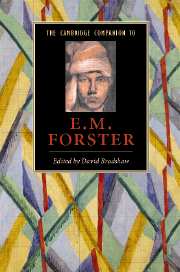Book contents
- Frontmatter
- Introduction
- 1 Forster’s life and life-writing
- 2 Bloomsbury and other values
- 3 Forster and England
- 4 Hellenism and the lure of Italy
- 5 Forster and the short story
- 6 Forster and the novel
- 7 Forsterian sexuality
- 8 Forster and women
- 9 A Room with a View
- 10 Howards End
- 11 Maurice
- 12 A Passage to India
- 13 Forster and modernism
- 14 Forster as literary critic
- 15 Filmed Forster
- 16 Postcolonial Forster
- Further reading
- Index
- Series List
3 - Forster and England
Published online by Cambridge University Press: 28 September 2007
- Frontmatter
- Introduction
- 1 Forster’s life and life-writing
- 2 Bloomsbury and other values
- 3 Forster and England
- 4 Hellenism and the lure of Italy
- 5 Forster and the short story
- 6 Forster and the novel
- 7 Forsterian sexuality
- 8 Forster and women
- 9 A Room with a View
- 10 Howards End
- 11 Maurice
- 12 A Passage to India
- 13 Forster and modernism
- 14 Forster as literary critic
- 15 Filmed Forster
- 16 Postcolonial Forster
- Further reading
- Index
- Series List
Summary
It is an opportune moment to consider Forster and England: the past few years have witnessed the publication of an important body of work in history, literary criticism, and cultural studies on Englishness during the late Victorian, Edwardian, and Georgian periods, when Forster came of age as an author. Drawing on this work, a number of critics read Howards End as a 'condition of England' novel, a fictional expression of popular anxieties about rising poverty, imperial decline, and race degeneration. Such analysts contend that Howards End, insistently focused on personal relations, also carries social and political implications. They interpret the novel as a national allegory in which interactions between various English types analyse England's unhealthy condition and project a better future. Other critics read A Passage to India as a dissenting imperial allegory, which assails the ills of Anglo-India and allegorises the impossibility of friendship between English and Indians under empire. I argue similarly that most of Forster's literary works can be understood as national allegories that diagnose an ailing nation and offer literary cures for the malaise they anatomise. Thus while he frequently writes against Edwardian England, Forster is also something of a literary patriot.
Forster's national allegories function in two ways: as parables of Englishness enlivened and as fantasies of England reconciled. Some offer women and men suffering from the pathologies of middle-class Englishness a passage to nature, passion, and freedom. In Where Angels Fear to Tread (1905), A Room with a View (1908), and A Passage to India (1924), Forster's English abroad are confronted with individuals and events that shock them.
- Type
- Chapter
- Information
- The Cambridge Companion to E. M. Forster , pp. 47 - 61Publisher: Cambridge University PressPrint publication year: 2007
- 1
- Cited by



